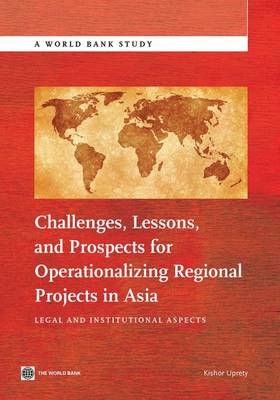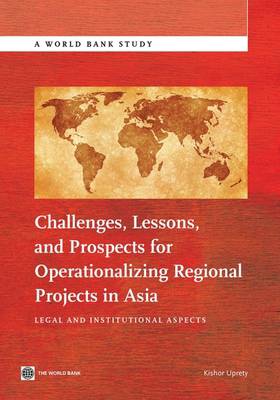
Bedankt voor het vertrouwen het afgelopen jaar! Om jou te bedanken bieden we GRATIS verzending (in België) aan op alles gedurende de hele maand januari.
- Afhalen na 1 uur in een winkel met voorraad
- Gratis thuislevering in België vanaf € 30
- Ruim aanbod met 7 miljoen producten
Bedankt voor het vertrouwen het afgelopen jaar! Om jou te bedanken bieden we GRATIS verzending (in België) aan op alles gedurende de hele maand januari.
- Afhalen na 1 uur in een winkel met voorraad
- Gratis thuislevering in België vanaf € 30
- Ruim aanbod met 7 miljoen producten
Zoeken
Challenges, Lessons, and Prospects for Operationalizing Regional Projects in Asia
Legal and Institutional Aspects
Kishor Uprety
€ 23,45
+ 46 punten
Omschrijving
Despite efforts made by the international development financing organizations, the structure of intervention through multi-country projects with regional development goals has not been easy to design and implement. One of the reasons is the lack of clarity in the enabling legal framework and tools, both within the client countries as well as the development organizations. Against this backdrop, this study, based essentially on desk research, with limited field consultation, attempts to discuss, primarily from a legal and institutional perspectives, the tools, prospects as well as the opportunities for designing and implementing regional projects, with particular focus on the emerging practice of the World Bank, and with a special reference to the Asia region. The study, comprises an introduction, deals with the general setting, the World Bank approach toward regional projects, the importance of political will and commitment, the general legal structures for regional projects, the uniqueness and challenges for Asia, the prospects and proposals, and provides a brief conclusion.
Specificaties
Betrokkenen
- Auteur(s):
- Uitgeverij:
Inhoud
- Aantal bladzijden:
- 79
- Taal:
- Engels
- Reeks:
Eigenschappen
- Productcode (EAN):
- 9781464801389
- Verschijningsdatum:
- 13/01/2014
- Uitvoering:
- Paperback
- Formaat:
- Trade paperback (VS)
- Afmetingen:
- 178 mm x 254 mm
- Gewicht:
- 176 g

Alleen bij Standaard Boekhandel
+ 46 punten op je klantenkaart van Standaard Boekhandel
Beoordelingen
We publiceren alleen reviews die voldoen aan de voorwaarden voor reviews. Bekijk onze voorwaarden voor reviews.









